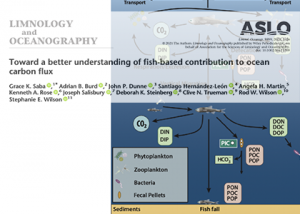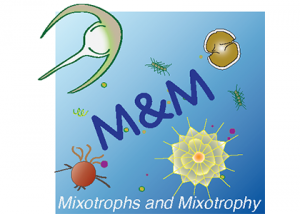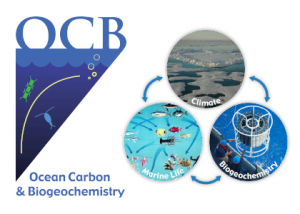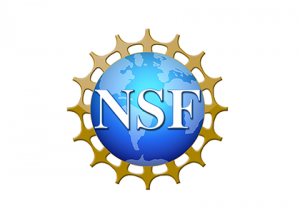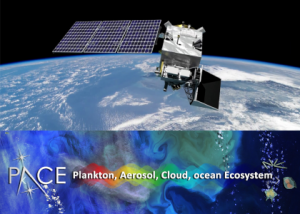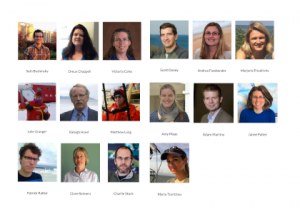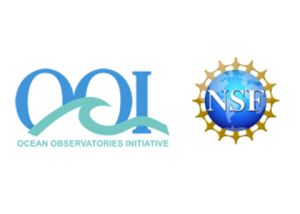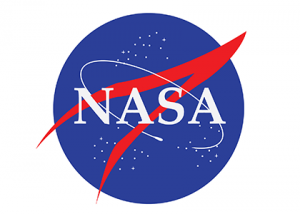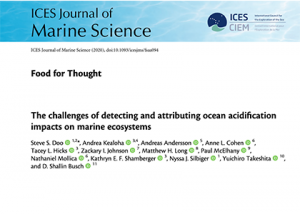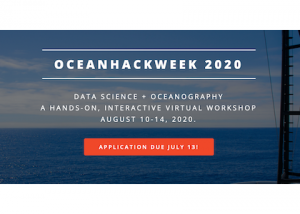Press release by Rutgers: Scientists have little understanding of the role fishes play in the global carbon cycle linked to climate change, but a Rutgers-led study found that carbon in feces, respiration and other excretions from fishes – roughly 1.65 billion tons annually – make up about 16 percent of the total carbon that sinks […]
Read MoreThe new Mixotrophs and Mixotrophy: Driving the Direction of Future Mixotrophic Research OCB Working Group will hold their first meeting on February 1, 11am to 12:30pm (EST). Anyone who is interested in hearing more about the working group and potentially participating is encouraged to attend. The meeting will also be recorded and made available via […]
Read MoreWe are excited to announce the outcome of the most recent OCB Activity Proposal Solicitation. The following activities will kick off in 2021: Carbon isotopes in the ocean: Ensuring high-quality results in the future (small workshop) – PIs: Ann P. McNichol (WHOI), Roberta Hansman (WHOI), Bob Key (Princeton), and Rolf Sonnerup (Univ Washington) Daily to […]
Read MoreThank you for all of the high-quality nominations that were submitted this year! In January 2021, we will welcome four new members to the OCB Scientific Steering Committee: Susanne Menden-Deuer (URI) – marine planktonic food web structure and function, plankton ecology Xinping Hu (TAMU Corpus Christi) – estuarine carbon cycle under changing climate conditions and […]
Read MoreClick for full details: Program Solicitation NSF 21-538 Full Proposal Target Date March 3, 2021 November 12, 2021 Second Friday in November, Annually Thereafter SYNOPSIS The Division of Ocean Sciences (OCE) offers postdoctoral research fellowships (PRF) to provide opportunities for scientists early in their careers to work within and across traditional disciplinary lines, develop partnerships, and […]
Read MoreThe PACE mission, a hyper-spectral mission spanning from the UV to the NIR, is preparing for launch in 2023 and in anticipation we would like to develop radiative products that will be most useful for the community. To guide this effort, we are asking potential PACE data users to provide input on what products of […]
Read MoreAs a cross-disciplinary, cross-institutional organization, the Ocean Carbon & Biogeochemistry (OCB) Program is conducting this brief survey to understand the current diversity of people in the OCB network and gather feedback on how we can increase support of and engagement with scientists from underrepresented groups in OCB-related careers. While we do intend to share summaries […]
Read MoreLast September, OCB organized an NSF EarthCube-funded meeting focused on shipboard ocean time series data (meeting report). One of the key recommendations that emerged from this workshop was the need for a sustained activity such as a research coordination network (RCN) focused on developing ecological and biogeochemical data and metadata standards and broadening users of […]
Read MoreOCB is seeking nominations for new Scientific Steering Committee (SSC) members. The following SSC members are scheduled to rotate off at the end of 2020: Andrea Fassbender (MBARI) – marine biogeochemical cycling, the ocean’s role in global climate through the carbon cycle Matt Long (NCAR) – biogeochemical and climate modeling Amy Maas (BIOS) – physiology, […]
Read MoreThe NSF- funded Ocean Observatories Initiative (OOI) deploys sensors that measure key biogeochemical properties (pH, pCO2, bio-optics, nitrate, dissolved oxygen) on both moored and mobile autonomous platforms across arrays in the Atlantic, Pacific and Southern Oceans. These sensors provide enormous potential to support the oceanographic community in studying a wide range of important interdisciplinary questions. […]
Read MoreROSES-2020 Program Element A.5 Carbon Cycle Science solicits proposals for research focused on carbon stocks and fluxes between and within freshwater, marine systems, and land ecosystems, and their exchange with the atmosphere. It also targets improving understanding of carbon cycle processes and feedbacks in critical ecosystems that are particularly vulnerable to environmental change. Substantive use […]
Read MoreThe Ocean Carbon and Biogeochemistry (OCB) Program is soliciting proposals for OCB activities that will take place or begin during the 2021 calendar year. Due to the COVID-19 pandemic, activities that can be conducted remotely (at least for the first half of 2021) are encouraged. Any proposed in-person activities should include contingency plans in case delays or cancellations are […]
Read MoreDear Science and Applications Team, Registration for the first PACE Applications workshop is now open! The 2-day virtual workshop scheduled for September 23 & 24, will showcase future uses of PACE satellite data and products to support decision-making for water resource management, air quality and health monitoring, climate modeling, disasters response and mitigation, and ecological […]
Read MoreA new publication is now available that have came out of discussions at the 2018 OA PI meeting in Portland, OR: Doo, SS, A Kealoha, A Andersson, AL Cohen, TL Hicks, ZI Johnson, MH Long, P McElhany, N Mollica, KEF Shamberger, NJ Silbiger, Y Takeshita, DS Busch (2020). The challenges of detecting and attributing ocean […]
Read MoreOceanHackWeek is a small hands-on, interactive virtual workshop focused on data science and oceanography that will be held during August 10-14, 2020. Join us for five days of tutorials, data exploration, software development and community networking! Please visit our website https://oceanhackweek.github.io/ for details. To apply, see https://oceanhackweek.github.io/applicant-info.html Application deadline: July 13, 2020. We expect to […]
Read More

